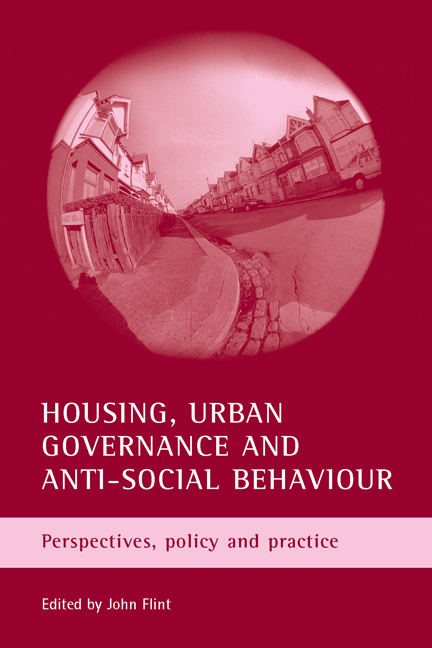Book contents
- Frontmatter
- Contents
- List of tables, figures and photographs
- Acknowledgements
- Notes on contributors
- Introduction
- Part 1 The definition and construction of anti-social behaviour in the UK
- Part 2 Legal techniques and measures utilised by social landlords to address anti-social behaviour
- Part 3 The emerging mechanisms of addressing anti-social behaviour in housing governance
- Part 4 Studies of housing and anti-social behaviour from an international perspective
- Index
ten - Tackling anti-social behaviour: an evaluation of the Dundee Families Project
Published online by Cambridge University Press: 15 January 2022
- Frontmatter
- Contents
- List of tables, figures and photographs
- Acknowledgements
- Notes on contributors
- Introduction
- Part 1 The definition and construction of anti-social behaviour in the UK
- Part 2 Legal techniques and measures utilised by social landlords to address anti-social behaviour
- Part 3 The emerging mechanisms of addressing anti-social behaviour in housing governance
- Part 4 Studies of housing and anti-social behaviour from an international perspective
- Index
Summary
Introduction
Although many social landlords have begun to take a preventative approach to anti-social behaviour (ASB), few landlords have developed intensive support services for families as a means of dealing with ASB (Scott et al, 2001; see Chapter Nine, this volume). This chapter provides an evaluation of an innovative approach to tackling ASB, based on a longitudinal study of the Dundee Families Project (Dillane et al, 2001). The Scottish Executive, Dundee City Council and NCH Action for Children Scotland jointly funded the research.
The Dundee Families Project was established with government Urban Programme funding to assist families who are homeless or at severe risk of homelessness as a result of ‘anti-social behaviour’. The Project was run by a charitable voluntary agency, NCH Action for Children Scotland, in partnership with Dundee City Council housing and social work departments. The Project worked with families deemed to have exhibited a range of ASB, with the aim of enabling them to avoid eviction or be restored to satisfactory tenancy arrangements. The Project provided an all-year 24-hours-a-day service and was intensively staffed, with a total of 15 staff in May 2001. The service was offered in three main ways:
• admission to the core block, which comprised accommodation for up to four families where residents received intensive support;
• support to a small number of dispersed flats run by the Project, for families needing accommodation but less intensive support;
• an outreach service provided to selected families in their existing accommodation, where they were at risk of eviction due to ASB.
The Project followed a systemic approach to family difficulties and offered a range of services through individual and couple counselling, family support and group work. These included:
• after-school groups
• young persons group
• cookery group
• parenting group
• parenting skills group
• craft group
• anger management group
• residents support group
• tenancy workshops.
Decisions on entry to the Project were made by an admissions panel, which assessed referrals and reviewed cases. The membership included representatives from the Project, NCH and Dundee City Council housing and social work departments. A project advisory group was also set up to provide guidance and feedback from service users and local residents.
- Type
- Chapter
- Information
- Housing, Urban Governance and Anti-Social BehaviourPerspectives, Policy and Practice, pp. 199 - 218Publisher: Bristol University PressPrint publication year: 2006
- 1
- Cited by



